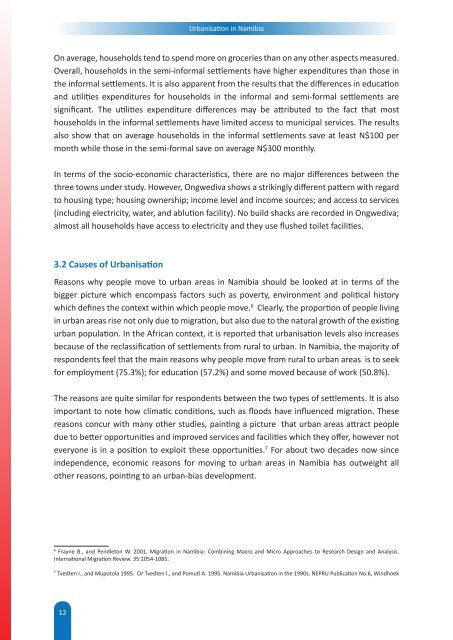Urbanisation-in-Namibia
Urbanisation-in-Namibia
Urbanisation-in-Namibia
Create successful ePaper yourself
Turn your PDF publications into a flip-book with our unique Google optimized e-Paper software.
<strong>Urbanisation</strong> <strong>in</strong> <strong>Namibia</strong>On average, households tend to spend more on groceries than on any other aspects measured.Overall, households <strong>in</strong> the semi-<strong>in</strong>formal settlements have higher expenditures than those <strong>in</strong>the <strong>in</strong>formal settlements. It is also apparent from the results that the differences <strong>in</strong> educationand utilities expenditures for households <strong>in</strong> the <strong>in</strong>formal and semi-formal settlements aresignificant. The utilities expenditure differences may be attributed to the fact that mosthouseholds <strong>in</strong> the <strong>in</strong>formal settlements have limited access to municipal services. The resultsalso show that on average households <strong>in</strong> the <strong>in</strong>formal settlements save at least N$100 permonth while those <strong>in</strong> the semi-formal save on average N$300 monthly.In terms of the socio-economic characteristics, there are no major differences between thethree towns under study. However, Ongwediva shows a strik<strong>in</strong>gly different pattern with regardto hous<strong>in</strong>g type; hous<strong>in</strong>g ownership; <strong>in</strong>come level and <strong>in</strong>come sources; and access to services(<strong>in</strong>clud<strong>in</strong>g electricity, water, and ablution facility). No build shacks are recorded <strong>in</strong> Ongwediva;almost all households have access to electricity and they use flushed toilet facilities.3.2 Causes of <strong>Urbanisation</strong>Reasons why people move to urban areas <strong>in</strong> <strong>Namibia</strong> should be looked at <strong>in</strong> terms of thebigger picture which encompass factors such as poverty, environment and political historywhich def<strong>in</strong>es the context with<strong>in</strong> which people move. 6 Clearly, the proportion of people liv<strong>in</strong>g<strong>in</strong> urban areas rise not only due to migration, but also due to the natural growth of the exist<strong>in</strong>gurban population. In the African context, it is reported that urbanisation levels also <strong>in</strong>creasesbecause of the reclassification of settlements from rural to urban. In <strong>Namibia</strong>, the majority ofrespondents feel that the ma<strong>in</strong> reasons why people move from rural to urban areas is to seekfor employment (75.3%); for education (57.2%) and some moved because of work (50.8%).The reasons are quite similar for respondents between the two types of settlements. It is alsoimportant to note how climatic conditions, such as floods have <strong>in</strong>fluenced migration. Thesereasons concur with many other studies, pa<strong>in</strong>t<strong>in</strong>g a picture that urban areas attract peopledue to better opportunities and improved services and facilities which they offer, however noteveryone is <strong>in</strong> a position to exploit these opportunities. 7 For about two decades now s<strong>in</strong>ce<strong>in</strong>dependence, economic reasons for mov<strong>in</strong>g to urban areas <strong>in</strong> <strong>Namibia</strong> has outweight allother reasons, po<strong>in</strong>t<strong>in</strong>g to an urban-bias development.6Frayne B., and Pendleton W. 2001. Migration <strong>in</strong> <strong>Namibia</strong>: Comb<strong>in</strong><strong>in</strong>g Macro and Micro Approaches to Research Design and Analysis.International Migration Review. 35:1054-1085.7Tvedten I., and Mupotola 1995. Or Tvedten I., and Pomuti A. 1995. <strong>Namibia</strong> <strong>Urbanisation</strong> <strong>in</strong> the 1990s. NEPRU Publication No.6, W<strong>in</strong>dhoek12


